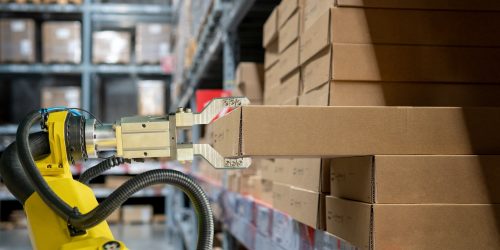Why should you choose the Manutan EXPERT private label for your business equipment?
Also called “store brands”, private labels offer a strategic solution for companies looking to optimise their procurement. They provide identical quality to premium brands at a lower price. In this article, discover all the benefits of purchasing private label products for your business, especially to cope with the current economic situation. These advantages are illustrated with the example of our private label, Manutan EXPERT. Here is our advice for incorporating a private label into your procurement strategy while expanding it.
The advantages of private labels in the current economic context
First, what is a private label? A private label has the distinctive feature of belonging to the retailer distributing it. The retailer sells their own brand alongside other brands in their physical or online store. They use their market knowledge to select their products according to their own specifications.
If developing a private label is less expensive than launching a national brand, it is mainly because marketing and sales costs are reduced. The brand name, clearly associated with the retailer’s in customers’ minds, is already known. Many retailers therefore do without advertising or invest less than a national brand. Putting the product on the market also does not require sales efforts – and therefore costs – to approach distributors. Optimising costs, combined with demanding specifications submitted to manufacturers, allows private labels to offer products with an excellent value for money to their customers.
Private labels are a solution for companies seeking to reduce their procurement budget during this inflation period. But buying better is not just about negotiating lower prices. An effective expenditure management relies on a thought-out procurement strategy. It provides direction and priorities, translated into an operational plan.
It also makes it possible to assess real expenditure related to procurement by better taking into account what is known as hidden costs. These costs correspond, for example, to poor monitoring of time spent on certain administrative tasks (product comparison, supplier evaluation, etc.) or actions that do not follow established processes.
Manutan EXPERT: A private label example
Our B2B private label, Manutan EXPERT, was created to meet the expectations of companies through a wide range of quality products, offered at a fair price and guaranteed for up to 10 years.
Since our beginnings, we have drawn on the more than 60 years of business relationships that the Manutan Group, to which we belong, has nurtured with companies of varying sizes and sectors. Our modus operandi is guided by the pursuit of our clients’ performance by offering a sustainable range supporting businesses. Our Manutan EXPERT brand development strategy is based on three pillars:
- Quality, i.e., durability over time and environmental preservation;
- Availability with a wide range of products shipped quickly;
- Competitive pricing to provide a quality alternative on the market.
Before being added to our catalogue, each of our Manutan EXPERT products undergoes a meticulous quality testing process. We want to check that the quality meets your expectations.
To provide proof of our commitment to quality, our Manutan EXPERT products come with a unique up-to-10-year warranty (3 years for personal protective equipment and electrical appliances). Consumables and perishable products are not guaranteed.
At the same time, we strive to avoid “over-quality”, a phenomenon that occurs when a product’s quality exceeds the customer’s actual needs. We therefore apply a quality and fair price policy.
At Manutan EXPERT, we offer thousands of references across 8 product ranges. Over 80% of our products are stocked in our European warehouses with the aim of shipping them quickly.
Lastly, to maintain our goal of offering prices on average 20% lower than the market, we constantly monitor pricing trends.
How to incorporate a private label into your procurement strategy
As we have seen, choosing a private label for your professional equipment enables you to save money while purchasing quality products. To do this, your procurement department needs to incorporate this new brand into its procurement strategy.
Your procurement function should therefore begin by mapping the product categories currently purchased by your company. Then, you need to analyse the breakdown of these purchases per supplier. This makes it possible to see if orders for products from the same category can be made within the same brand.
Next, it’s about choosing the most suitable private label based on your current expenditure, your budget and other parameters specific to your company, such as delivery times, associated services, etc. The aim is to gain efficiency by buying better and reducing time spent on procurement.
Incorporating a private label is also an opportunity for you to strengthen the sustainable dimension of your procurement policy. The image of the private label being closely linked to that of the company developing it, it is common for the values of the retailer to be reflected in the brand’s commitments. The retailer has every interest in keeping their promises to their customers and providing evidence unless they want to risk jeopardising their image.
Taking the example of Manutan EXPERT again, there are great similarities between the Manutan Group’s environmental and social commitment and that of our private label. Many Manutan EXPERT references are manufactured in Europe as local sourcing is a way to reduce the transport time of goods while supporting European expertise. The number of sustainable products within our Manutan EXPERT range also continues to grow. These include, for example, items made from recycled or recyclable materials, bearing a recognised ecolabel, etc.
Discover all our Manutan EXPERT equipment for your business and start your sustainable procurement strategy right away!






